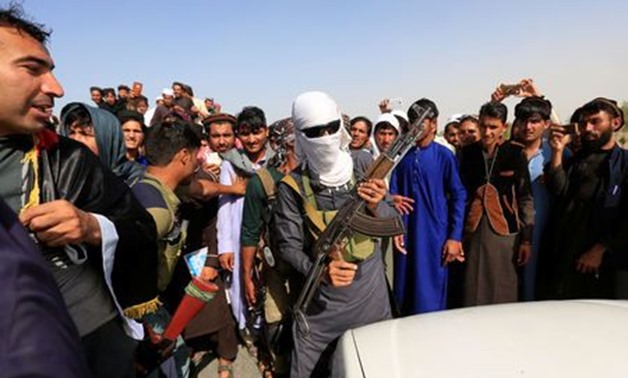
A Taliban (C) stands celebrates ceasefire with people in Rodat district of Nangarhar province
KABUL/WASHINGTON - 20 June 2018: Prospects have risen for negotiations between the Taliban and the United States after Afghan President Ashraf Ghani called a ceasefire and allowed militants to roam into cities in a gamble to encourage peace talks.
The Taliban, ousted from power in 2001 by U.S.-led troops, insist that any negotiations with what it calls the "puppet" Afghan government on a peace plan can begin only after talks with the United States about withdrawing foreign forces.
Analysts and Western diplomats said Ghani's offer to hold unconditional peace talks set the stage for U.S. officials to open back-channel negotiations with the Taliban.
"Ghani has done his bit," said Thomas Ruttig, co-director of Afghanistan Analysts Network, an independent think tank.
"It is now for the U.S. to cut through this blockade," he said, although that would be a departure from U.S. policy that talks to end the 17-year-old war must be wholly Afghan-led.
U.S. Secretary of State Mike Pompeo appeared ready to tweak the policy when he welcomed Ghani's 10-day extension of a ceasefire that is currently due to end on Wednesday. The Taliban said its ceasefire ended on Sunday.
"As President Ghani emphasised in his statement to the Afghan people, peace talks by necessity would include a discussion of the role of international actors and forces," Pompeo said. "The United States is prepared to support, facilitate and participate in these discussions."
Richard Olson, a former U.S. special envoy to Afghanistan and Pakistan, described the statement as significant "in that it signals that the U.S. is prepared to ultimately discuss the issue that is paramount to the Taliban, which is the withdrawal of foreign forces."
Nolen Johnson, a State Department spokesman, said Ghani had invited the United States to "participate in an Afghan-led peace process," and there was no substitute to the Taliban engaging with the "sovereign" Kabul government.
A senior U.S. official, speaking on the condition of anonymity before the start of the ceasefire, said, however, there were a number of issues that made direct talks between the Taliban and the United States unlikely in the short term.
The official said there was a substantial gap in knowledge about the Taliban - for instance as to who had the authority to negotiate on their behalf. There is not enough intelligence or resources on this issue," the official said.
A second official said there was still a question of what would happen with hardline elements of the Taliban. "There are Taliban that won't come to the table," the official said.
TALIBAN CALL
The Taliban, in a statement marking the end of their ceasefire on Sunday, said the organisation was unified and called on "the invading American party" to "sit directly for dialogue with the Islamic Emirate to find a solution for the ongoing imbroglio."
A senior diplomat with knowledge of the negotiations leading to the ceasefire estimated the chances of eventual talks between the Taliban and the Afghan government at "50-50."
"The Taliban want to talk to the U.S. directly on withdrawal (of foreign forces) because they do not want to share the credit of withdrawal with the government," the official said.
While Washington has long resisted direct talks with the Taliban, the official said recent developments indicate "the U.S. now seems less and less averse to it".
In August, U.S. President Donald Trump unveiled a more hawkish military approach to Afghanistan, including a surge in air strikes. Afghan security forces say the impact has been significant, but the Taliban roam huge areas of the country, and with foreign troop levels of about 15,600, down from 140,000 in 2014, there appears little hope of outright victory.
Ghani, never widely popular, met his predecessor, Hamid Karzai, on Sunday to secure support for peace talks. He visited a restaurant in Kabul where he met diners and took selfies with children, trying to capitalise on the unprecedented party atmosphere created by the ceasefire to mark last weekend's Eid al-Fitr festival.
But Amrullah Saleh, the former head of intelligence and head of a political party, said Ghani had committed a blunder by allowing insurgents to pour into government-controlled areas.
"Thousands of Taliban fighters were allowed to enter with guns and some of them could be hiding in civilian areas, planning attacks," Saleh told Reuters.
Ghani has also come in for praise.
"Now we can say that our president is making an absolute honest attempt" for peace, said Anwar-ul-Haq Ahadi, chairman of the outspoken New National Front of Afghanistan.

Comments
Leave a Comment